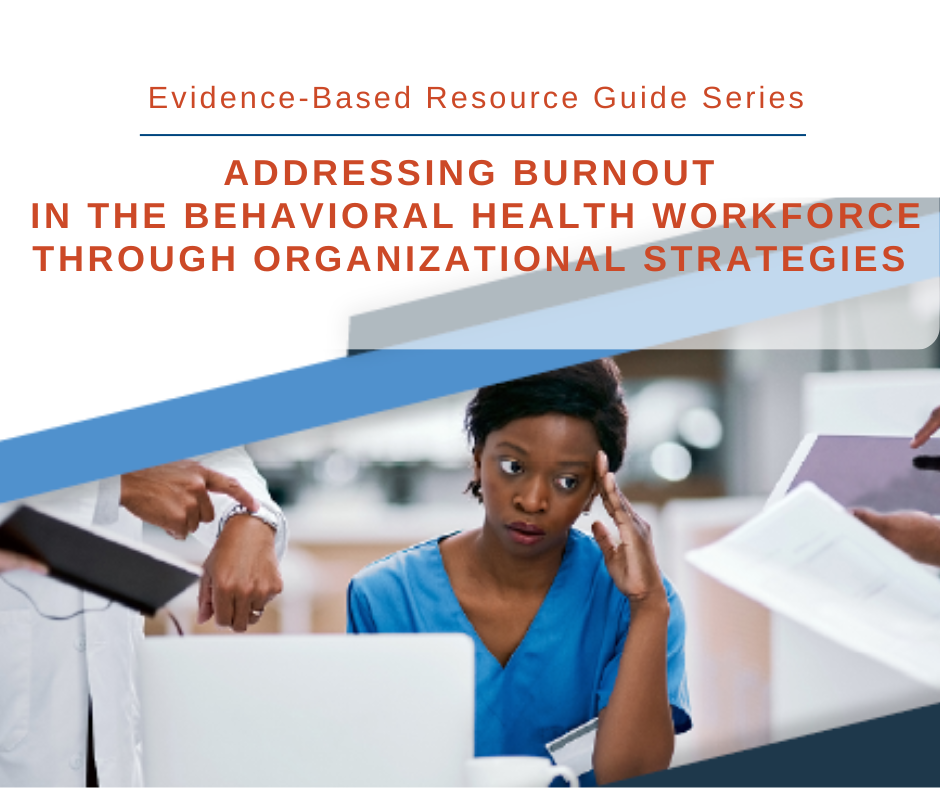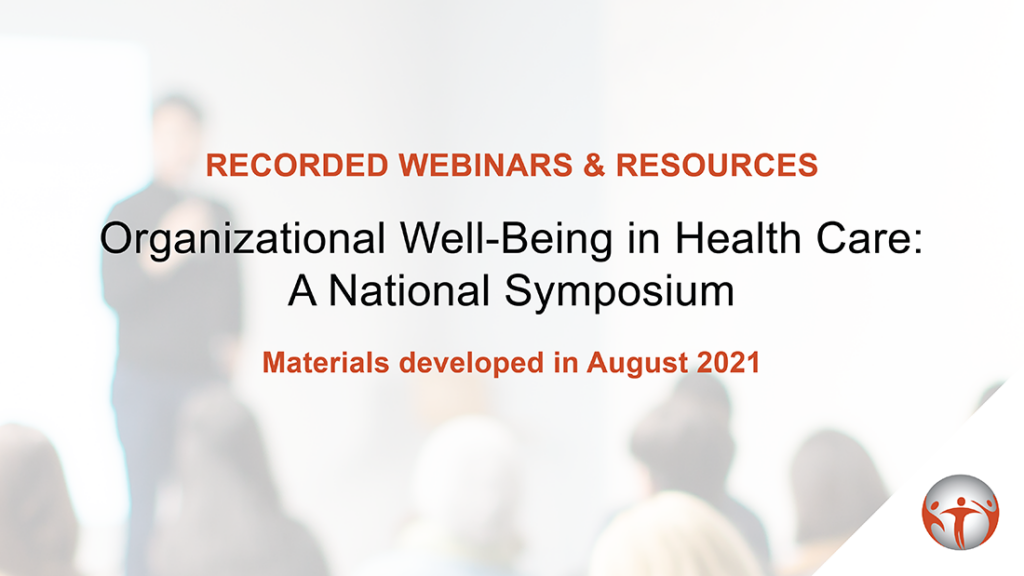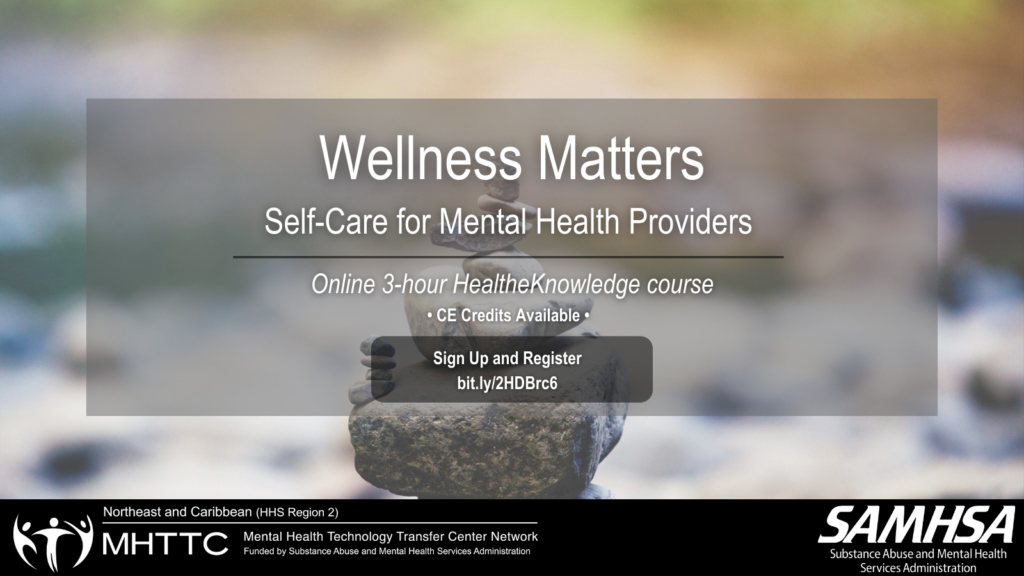Home > Provider Well-Being
In 2020, the MHTTC Network quickly responded to support the behavioral health workforce during a global health pandemic. The Network's Provider Well-Being Initiative was established from 2020-2021 to support provider well-being and work with agencies to implement organizational-level interventions that optimize provider satisfaction and health. Learn more and view our Provider Well-Being Initiative Year End Highlights 2020-2021 here.
Since 2021, our Network has continued to navigate the needs of the behavioral health workforce through COVID-19 and beyond. The following are MHTTC events and resources geared to behavioral health providers and building strategies for ongoing self-care tactics to enhance personal and professional resilience.


This previously recorded webinar highlights findings from SAMHSA’s guide titled, Addressing Burnout in the Behavioral Health Workforce through Organizational Strategies, which explores evidence-based, organization-level strategies and promising practices to address burnout within the behavioral health workforce. Access the guide here!

Organizations must play a role in evaluating and addressing the conditions influencing their employees’ well-being. To address this need, in August 2021, the MHTTC Network hosted Organizational Well-Being in Health Care: A National Symposium, a free two-day event; during which national leaders shared the latest innovations and research in this area.
The webinar recordings and resources from this convention are now available. At your convenience, you can learn how health care organizations can benefit from investing in these values and walk away with practical measures your organization can implement at various levels, especially with administrative buy-in.
Click here to access the resources and recordings for the event.

Developed by the Northeast and Caribbean MHTTC, this course consists of 3 one-hour modules with interactive exercises and assessments focusing on:
Note: This course has been pre-approved for CE credits.

Back to School After COVID-19: Supporting Student and Staff Mental Health Toolkit | New England MHTTC
This toolkit is designed to help guide conversations to include a trauma-informed, equitable, and compassionate lens to providing mental health supports to every member of the school community. Because we will all return to school as different people than when we left, caring leaders are seeking to support each other in turning our tragedies into growth, recognizing the joys amongst the ongoing and profound difficulties, and re-establishing school communities to serve everyone, with greater justice and equity.
Building Psychological Resilience for the Public Health Workforce During the COVID-19 Pandemic | Southeast MHTTC
This webinar offered information on awareness, self-care, and connection with others so public health workers can develop a plan for maintaining their mental health. We discussed common issues such as coping with fear, anxiety, and loss; changing work demands; navigating family relationships; and coping with an uncertain future as the pandemic continues.
Building Resilience Among Physical and Behavioral Healthcare Providers During a Global Health Pandemic | Mountain Plains MHTTC
This toolkit has been developed to encourage self-care and to assist in building resilience among physical and behavioral healthcare providers amidst the global health pandemic. It walks the reader through a case scenario of one rural primary care provider who learns to identify signs of common mental, emotional, and psychological concerns that have arisen because of the global health pandemic. Following the case presentation are strategies for developing a personal mental health and wellness plan as well as recommendations for the health systems who employ these essential, frontline workers.
Compassion Fatigue: Managing During Troubling Times | Southeast MHTTC
Many workers have been pushed to the limit as they seek to adjust to a “new normal.” This presentation defined and identified signs and symptoms of compassion fatigue while also offering suggestions in avoiding and/or overcoming compassion fatigue. We also discussed healthy self-care activities while also developing boundaries and a balance between work and home life. You can also view the accompanying fact sheet here.
Compassion Fatigue Resilience Series | Pacific Southwest MHTTC
Developed by the Pacific Southwest MHTTC, this series is focused on addressing compassion fatigue which includes elements of burnout (work demands that outpace psychological resources), secondary traumatic stress (vicarious traumatization), direct traumatic stress (the experience of fear when treating patients), and prior traumatic stress history (Figley et al., 2004). Its signs resemble those seen in post-traumatic stress disorder (PTSD), and include physiological hyper-arousal, anxiety, avoidance, social withdrawal, irritability, and persistent thoughts about difficult, “traumatic” clinical experiences.
COVID-19 and Mental Health Resources | Pacific Southwest MHTTC
The Pacific Southwest MHTTC curated a series of topical resource sheets to help you find high-quality tools and information on caring for yourself, your families, and the communities you serve.
Educator Self-Care and Thriving During a Public Health Crisis | Northeast and Caribbean MHTTC
With the current public health crisis, we are facing a new way of engaging and teaching our students. While some of us may have been doing some assignments remotely in the past this new platform and the current social distancing orders have created a whole new set of stressors on our educators, their students, and families. This webinar provides some helpful hints to help us all survive and thrive during this time while simultaneously taking care of ourselves, our students, and their families.
Educator Wellness Series | Northwest MHTTC
The Northwest MHTTC, in Partnership with WellEducator & the Northwest PBIS Network, brings you the Educator Wellness Series! This Educator Wellness Series is designed for you, the educator, to take a break from what can feel like an overwhelming hustle to prepare, deliver, and support your students and focus on your own wellbeing. We designed this 4 Session Series to support you in tapping into your resiliency skills, increasing your self-compassion, creating self-care routines, building a practice of gratitude and appreciation, and celebrating - even those small successes - to support your wellbeing.
Happy Teachers Practice Self-Care | Great Lakes MHTTC
This presentation focuses on prioritizing self-care while working from home. Presenters introduce the impact of job burnout, as well as how to recognize signs and symptoms; define “Social Emotional Learning” and provide examples on how this can be included in the classroom or virtually; discuss tools to help prevent burn-out, and set boundaries to separate work time from personal and develop a self-care plan.
Promoting Educator Well-Being: Compassion Fatigue, Burnout and Secondary Traumatic Stress in the Era of COVID-19 | Central East MHTTC
This webinar training explores the differences between and strategies to counter fatigue, burnout, and secondary traumatic stress. Participants also learn strategies to enhance well-being and promote job satisfaction.
Provider Wellness During a Public Health Crisis | Northeast and Caribbean MHTTC
A public health crisis causes distress for all involved, including providers of behavioral health services. Attending to our personal well-being during this time is just as important as supporting individuals receiving services. Hosted by the Northeast and Caribbean MHTTC, this webinar recording highlighted specific tools, strategies, and resources that promote provider well-being.
Resource Guide for Mental Health Providers During COVID-19 | National American Indian and Alaska Native MHTTC
This is a list of resources that have been compiled during the National American Indian and Alaska Native MHTTC's series: Strategies of Support for Mental Health Providers - Empowering one another during times of crisis. This guide was tailored for providers who are Native and/or are working with American Indian and Alaska Native individuals.
Resources for Primary Care Providers Experiencing Stress Related to COVID-19 or Other Health Care Crises | Mid-America MHTTC
This one-pager provides an overview of resources for primary care providers experiencing stress during the COVID-19 pandemic or other health care crises.
Self-Care and Compassion for the Educator Webinar Series | Northwest MHTTC in partnership with the Northwest PBIS Network
During these sessions, participants practice skills to decrease stressors on mind/body systems to stay connected to the wonders and curiosities of teaching using evidence-based mindfulness practices, radical acceptance and values-driven goal setting.
Self-Care in Overwhelming Times | New England MHTTC
These are overwhelming times. Stress, anxiety, fear, loss, and grief – all part of ordinary life – are exponentially heightened in this time of pandemic. How do we name what we’re experiencing? How do we stay healthy in body, mind, and spirit? How do we keep gentleness and compassion alive for self and others?
Self-Care Through the Summer | Mid-America MHTTC
This handout for educators and school mental health providers provides tips for recharging after a school year cut short because of the COVID-19 pandemic.
Stress, School, and Self-Care: COVID-19 Highlights Inequities, Mental Health Challenges, Systemic Needs, and Possible Solutions| New England MHTTC
This Childhood-Trauma Learning Collaborative (C-TLC) issue brief shares results of the reflective conversations the New England MHTTC has had with C-TLC Fellows - a unique group of district leaders, educators, and school-based mental health professionals with whom the New England MHTTC has built a sense of trust and community over the past 18 months.
Support Strategies for Supervisors and Providers During COVID-19 | Northeast and Caribbean MHTTC
The Northeast and Caribbean Mental Health Technology Transfer Center (MHTTC) hosted mutual support calls for mental health supervisors and direct service providers during the COVID-19 pandemic. Included in the document are tips and resources that supervisors have shared with us over the last few weeks to address the challenges of providing supervision during this current crisis.
Taking Care of Yourself During a Public Health Emergency | Northeast and Caribbean MHTTC
Coping with a public health emergency can be stressful and worrisome. This resource, developed by the Northeast and Caribbean MHTTC, addresses steps you can take to care for yourself during difficult times. There are also services and supports available if you need a higher level of emotional care.
Tools for Behavioral Health Professionals During a Public Health Crisis | Northeast and Caribbean MHTTC
Developed by the Northeast and Caribbean MHTTC, this resource addresses that a public health crisis can cause distress for all involved, including providers of behavioral health services. Attending to your personal well-being during this time is just as important as supporting the individuals you serve. Providers are encouraged to be aware of the toll that working with others in distress can have on their own mental well-being.
Understanding and Managing our Reactions to COVID-19 | Northeast and Caribbean MHTTC
The recent events surrounding the COVID-19 pandemic have impacted mental health providers and all who provide support and care in unanticipated ways. This webinar provided attendees with a brief overview of how the body can react to the stress and trauma related to COVID-19. In this webinar, we introduced several evidence-based strategies to reduce anxiety, distress, and hyperarousal. Additional resources can also be found here.
Wellness and Self-Compassion: Supporting Mental Health and Substance Use Providers during the Pandemic | New England MHTTC
This webinar focused on how providers are coping and how to best support this critical segment of the workforce. Participants learned how hopelessness, fatigue, stress, trauma, and social distancing are impacting the well-being of mental health and substance use practitioners. Presenters highlighted the need to practice self-compassion, holistic wellness, and self-care as essential strategies to deal with compassion fatigue and burnout.
Wellbeing Through Crisis: Emotional PPE | Pacific Southwest MHTTC
While it can be difficult to reflect in the midst of a crisis - like in the case of the COVID-19 pandemic - this session dedicated time to exploring strategies for improving leadership’s response in times of crisis. This session explored the Crisis Leadership Continuum (readiness, response, recovery, and renewal), highlighting health care leadership approaches and strategies integral to ensuring staff wellbeing through crisis.
CDC: Self Care During an Emergency
DTAC: Tips for Healthcare Professionals: Coping with Stress and Compassion Fatigue
National Child Traumatic Stress Network: PFA-S: Provider Self-Care
National Child Traumatic Stress Network: Taking Care of Yourself
SAMHSA’s Disaster Distress Helpline is standing by 24/7 to support you during the pandemic & beyond. Toll-free, multilingual, & confidential support services are available to all residents in the U.S. & its territories. Call 1-800-985-5990 or text TalkWithUs to 66746 to connect with a trained counselor.